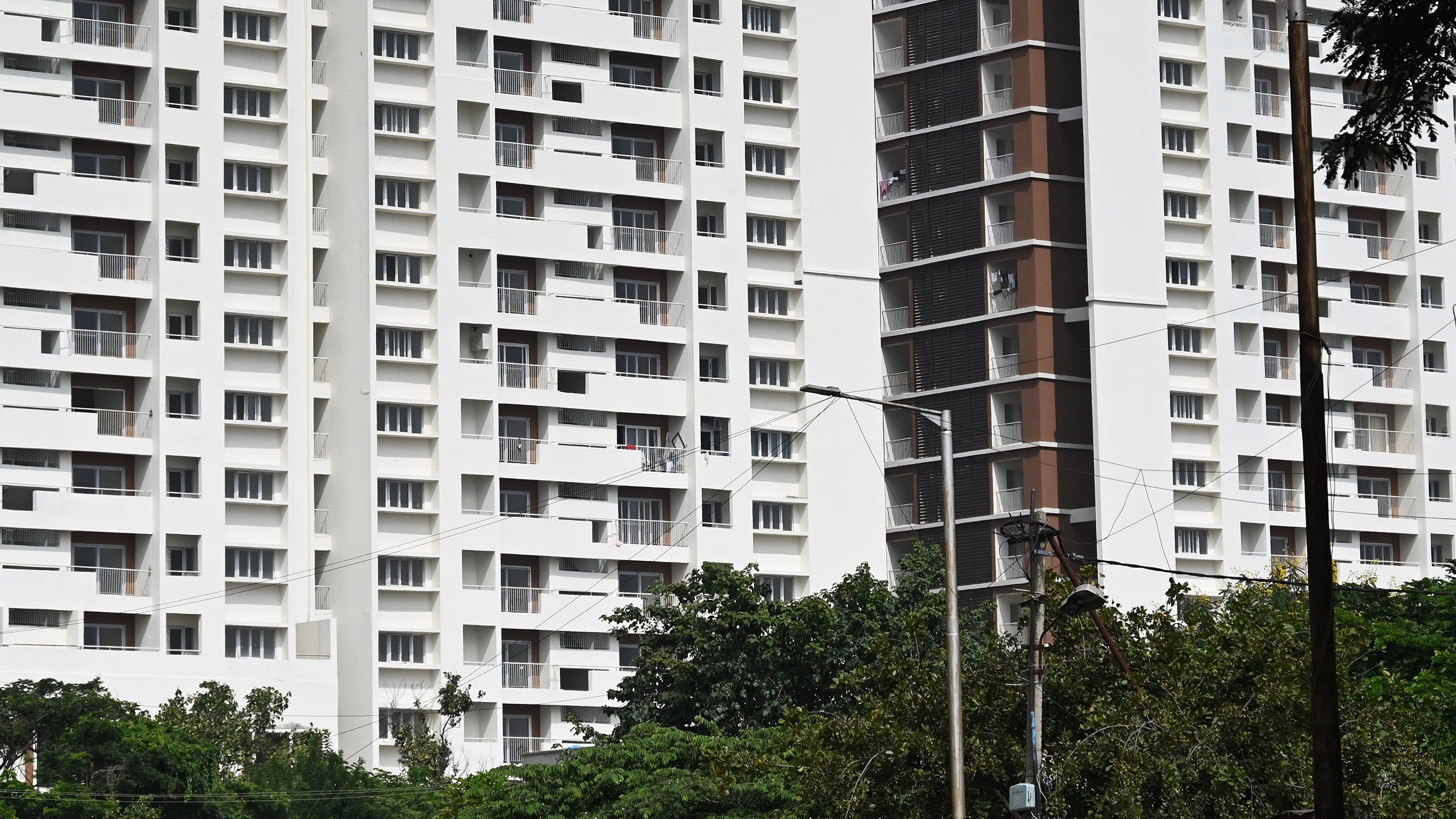
An apartment complex in Bengaluru. Pic for representation.
C: DH PHOTO/PUSHKAR V
A recent attack on a flat owner in Yelahanka has brought the spotlight again on laws governing resident welfare associations (RWAs).
Apartment buyers and forums Metrolife spoke to said the state government should amend the existing laws to clear the confusions, or bring in a new law altogether.
On Sunday, Dr Sunil Kumar Hebbi was assaulted by members of the RWA of the building where he resides, and a case was booked against them.
He had said the association was illegal because it was registered under The Karnataka Societies Registration Act (KSRA) of 1960, by his reckoning not the relevant act.
He had argued the RWA wasn’t empowered to collect money from residents for the upkeep of the apartment. Based on his complaint, the District Registrar of Cooperative Societies had reportedly blocked the corpus fund of the association.
A deputy registrar of cooperative societies told Metrolife that such associations have to register under The Karnataka Apartment Ownership Act (KAOA), 1972, and not under KSRA, 1960, or The Karnataka Co-operative Societies Act (KCSA), 1959. Apartment buyers say multiple acts and court rulings have complicated the matter.
‘KAOA inadequate’
In the recent past, the Karnataka High Court has deemed it unlawful to register apartment associations
under KSRA. Still, a good number are registered under KSRA, especially those that came up before 2010, before the housing boom in the city, says Vikram Rai, president, Bangalore Apartments’ Federation. He says they should not be censured because their illegality isn’t intentional.
“KAOA was passed in 1972 but it was never adequately implemented. It has a lot of gaps, in terms of clarity of ownership, setting up of a competent authority, and grievance redressal. Many apartments in the past, thus, registered under KSRA, meant for charitable organisations. Plus, the registration process under KSRA was simpler than under KAOA, and they were allowed to collect a subscription fee for social welfare,” he explains.
However, he asks if KSRA-registered associations now stand cancelled and can’t collect maintenance fees, how the apartment will be maintained.
He notes that in some cases, the High Court has given three to four months for apartment associations to move from KSRA to KAOA. “The government must define a way for apartments registered historically under KSRA to migrate to KAOA. This has been our long demand,” he adds.
Dhananjaya Padmanabhachar, convenor of Karnataka Home Buyers Forum (KHBF), says 60-70% apartment associations in the state are under KSRA. “It’s because KAOA falls short. While it makes a mention of the competent authority (Registrar of Cooperative Societies), the state government hasn’t yet passed a gazette notifying it,” he says.
‘Maharashtra model’
The Karnataka Ownership Flats Act (KOFA), 1972, is also there. He says, “Section 10 says apartment associations can be formed as cooperative societies under KCSA and collect maintenance fees. Barely 100 apartments have applied. The law, made for societies like dairy farmers’, has gaps.”
Registration of apartment associations is crucial with respect to the transfer of land title under the Real Estate (Regulation and Development) Act (RERA) or KOFA. “Land is a state subject. It’s the responsibility of the state government to give directions for complying with RERA, a central legislation. Maharashtra has been an early adopter. It has implemented the laws on title transfer to cooperative society of flat owners,” he says.
A recent HC ruling, he observes, has added to the bewilderment: “It says if you are purely residential, you need to register under KAOA. But if you are a mix of residential and commercial, then register as a cooperative society.”
In February, in the Assembly, Deputy Chief Minister D K Shivakumar announced that a new apartment law was in the works. “But the need is to do it in an expeditious manner,” says Rai.
What the law says
According to advocate Pradeep Kumar P K, KCSA is currently the right forum to register apartment
associations and has been endorsed by the state government.
“The High Court has said that apartment associations registered under KSRA can’t collect maintenance fees,” he says.
Aggrieved citizens can complain against KAOA-registered RWAs at the civil court. In KSRA and KCSA
cases, they can also go to the registrar of cooperative societies, he adds.
Advocate Sharan B Tadahal says the statutory fee and paperwork demanded under KAOA are high when compared to KCSA, and that is why apartments avoid the former.